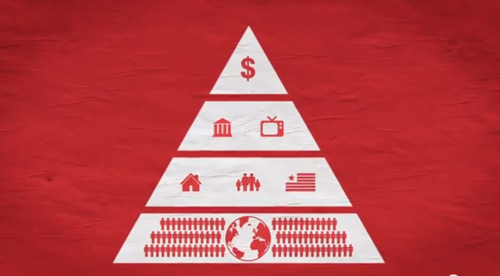
So much has been written about KONY2012, the 30 minute video by Invisible Children about the Ugandan warlord Joseph Kony, that I won’t bother to rehash it here. Instead, read Ethan Zuckerman’s analysis, Xeni Jardin’s tracking of the anti-gay, Christian right donors to the campaign, or Alex Dewaal’s evenly-keeled criticism at the World Peace Foundation.
I have two main observations: first, look at the image above, which shows up towards the end of the film to illustrate how the world no longer funnels power from the wealthy to the powerful to the people. The elevation of the United States (see the flag) above the “people of the world” is most likely not intended to imply that Americans are or were superior to the rest of the world. But it’s jarring given the accusations of colonial intent being leveled at the filmmakers. Second, did no one else feel even a brief shiver down their spine to hear the excitable conclusion to the film? “The better world we want is coming. It’s just waiting for us to stop at nothing,” says narrator Jason Russell. “Holy shit, brr, how do you spell ‘totalitarian’?” say I.
On a related note, I’ve been saddened to read the coverage about Homeless Hotspots, currently the topic du jour to come from the South by Southwest festival. The idea: give homeless people (all of whom agree to take the gig) a MiFi device so conference attendees can pay to access 4G networks. There’s been a lot of discussion about this, and a robust backlash-to-the-backlash mounted by organizing agency, BBHLabs. Once again, I fall into the camp of finding this exercise to be a too superficial swipe at a complex issue, with a dehumanizing element to boot.
To be clear, I think the intentions of both campaigns are sincere. And it’s smart to use contemporary ideas and methods to bring new life to often-struggling sectors. Yet we know that technology is only a part of the answer; not the answer in and of itself. And somehow both these campaigns seem to have got so carried away with the potential of techno-optimism that they’ve lost sight of some of the starker, deeper and more complex realities of our societies and worlds, not to mention the knock-on effects of some of this behavior. I was musing about this on Twitter last night when the PR woman reached out to me to urge me to talk to BBH’s chief to learn more about this “social experiment.” For me, that phrasing was telling. As long as human beings are considered to be no more than fodder for a social experiment for a marketing company, then we’re not doing it right yet. (Tim Carmody strikes a similar note in a good piece for Wired.) Color me old-fashioned, but I’ll continue to vet and support causes the way I’ve always done.
The 75 million viewers of KONY2012 show there is clearly a hunger for action. Those looking to highlight and address the issues facing the homeless shouldn’t be criticized for their noble instincts. Techniques of the modern age should absolutely be harnessed in the name of change. But sticking up posters or turning people into objects for a week or so seem like weak, short-term solutions that mainly benefit the instigators, not the so-called recipients of the largesse. I feel absolutely certain we can do better.
runaway-trains-blog reblogged this from thoughtyoushouldseethis-blog
kayseeang reblogged this from thoughtyoushouldseethis-blog
lovesmewritten-blog liked this
organic-leftovers liked this
kris5y-com liked this
 stalkfashion-blog liked this
stalkfashion-blog liked this thetastress liked this
slavin liked this
snippetsfromstrangers liked this
roguevague liked this
predispositions-blog1 liked this
geecee81-blog-blog liked this
thoughtyoushouldseethis-blog posted this